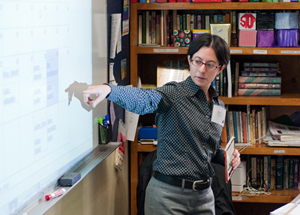Emily Vezina’s enthusiasm is infectious. “I love language, and I love words,” says this teacher of Latin and English in Williston’s Middle and Upper Schools, who transmits daily her excitement to her students. “I’ve been told my vocabulary tests are fun,” she boasts.
And the school can boast that we have an editor of the dictionary as a member of our faculty. After graduating from Vassar College with a degree in Latin, Vezina worked for four years at Merriam-Webster in Springfield, MA, as a general definer before she started teaching in 2005. Now she brings the same level of care and attention to teaching that she once spent on word defining and editing.
 |
| Emily Vezina reviews vocabulary during Family Weekend |
“We use words to describe everything,” Vezina points out. She found the process of researching for the dictionary infinitely fascinating, such as when she was tasked with revising the definition of “theremin” for Merriam-Webster’s Collegiate® Dictionary, Eleventh Edition and learned all about this “purely melodic electronic musical instrument typically played by moving the hands in the electromagnetic fields surrounding two projecting antennae.”
Vezina even has her picture in the dictionary under “pince-nez.” When she heard that the staff illustrator was in need of models, she volunteered. The resulting picture is a combination of Vezina in her reading glasses and a woman from an 1800s Sears Roebuck catalog.
Vezina taught Latin at Worcester Academy for three years before coming to Williston. Now she enjoys “getting to know kids and supporting their experiences in learning about language and literature as well as life.” Her approach to teaching vocabulary is based on the fact that, “when you come upon a word, it’s not isolated from other words and ideas. You want to look it up because you heard or read it somewhere and you want to know what it means.” So her seventh grade English students help her to pick words out of the texts they read in class. Using a calendar and webpage in WillyNet, Williston’s intranet, students receive a schedule for their words, then post definitions and example sentences for their classmates to review.
When it’s time for a test, Vezina includes questions that ask students to demonstrate nuanced knowledge of a word, such as writing a pep talk telling a friend not to “defer” their dreams. “This is a more realistic test of their knowledge, since words always occur in context,” Vezina emphasizes. “I want them to show me that they know what a word means, not just tell me.” She credits her conversations with colleagues, as well as the inspiration of her own teachers, as contributing to successes such as this in the classroom.
Like many Williston teachers, Vezina believes learning extends beyond both the classroom and the topic at hand. In addition to teaching, she is an advisor for PRIDE (formerly the Gay/Straight Alliance) and a dorm parent in Logan House. Early on her teaching career, she “realized pretty quickly that teaching Latin or English is good and fulfilling but the most important thing is to teach kids how to be happy good people.”

